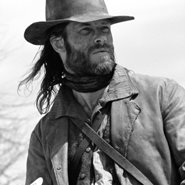The Proposition
 I wrote the following film review back in October for Peter Breen of Urban Eyes and Cafe Jugglers for posting on his "Out of This World and Into It" email letter. I hope he won't mind me republishing it here.
I wrote the following film review back in October for Peter Breen of Urban Eyes and Cafe Jugglers for posting on his "Out of This World and Into It" email letter. I hope he won't mind me republishing it here.
Not a film for the fainthearted, The Proposition (Directed by John Hillcoat; Written by Nick Cave) peels back the layers of revisionist history and gives us an unsettling look at the brutality of nineteenth century Australia. A self-styled "Australian Western," this is essentially a bushranger film, set in the 1880s, but these madmen make Heath Ledger's Ned Kelly look like a pansy! There isn't a bad performance here, and Nick Cave's music is suitably haunting. Guy Pearce (pictured left) is Charlie Burns the bushranger tracking down his homicidal rapist brother Arthur (Danny Huston). Charlie has accepted a proposition from the local policeman, Captain Stanley (Ray Winstone) - if he kills his older brother he and his younger brother can escape the gallows. Eventually he finds his brother and "will he or won't he kill him?" is the question that keeps the audience going. Stanley and his wife (Emma Watson) seek desperately to "civilize" this savage country. They want to replicate England as best they can, steadfastly refusing to come to terms with, or seek to understand, the hostile wilderness that surrounds their little island of a frontier town. The visual cues to this are fascinating to watch for. Mrs. Stanley has roses, that most English of plants, growing in her front yard. The fence around their homestead is a white picket fence (though the cross bars are rough-hewn Australian gum, an interesting juxtaposition of old and new world materials). A portrait of the Queen dominates their dining room. They open a box of Christmas decorations including white cotton "snow" and they sit down on Christmas Day to carve a hot roast dinner, though it's probably 100 degrees in the shade outside. During this Christmas meal they are brutalised by Arthur, the mad Irish bushranger, who wraps his victim's bashed and bleeding head in the union jack. Here in this climactic (and difficult to watch) scene, Charlie must make his decision - does he intervene and take his brother out or will family ties prove too strong?
Indigenous people fare quite well in this film. There are certainly depictions of subjugation, humiliation, brutality and race hatred ("What is an Irishman?" asks deranged bounty hunter Jellon Lamb [John Hurt] but a nigger turned inside out?") But at the same time, the Aborigines are a force to be reckoned with. Somewhat like a John Ford westerm where the Indians are almost a force of nature inhabiting the landscape like the the rocks and the desert sands of Monument Valley, the Aboriginal people of this film are a constant threat to those who dare to walk into their country (beautifully shot by the way). They are skilled warriors, they are dangerous, they know the territory in a way that white people could never hope to know it, and if you wander onto their turf, you might at any time find yourself fatally speared when you least expect it. Giving the Indigenous people the upper hand in their own country works well in establishing their dignity and self-reliance. Two other scenes work in a similar way. One of Arthur Burns' gang members is an Aboriginal man, and when a racist policeman falls into his trap while looking for his Aboriginal tracker (played by David Gulpilil - again!) he is told "You've got the wrong f***in' blackfella!" In a strange way you find yourself wanting to cheer for this guy - even though the life of a bushranger is hardly admirable, at least it's self-determining! More subtly, but just as powerfully, when Captain Stanley lets his Aboriginal domestic servant go, before walking through the gate, presumably to return to his own country, he removes his shoes (symbol of the white man's repression), places them carefully in the dirt and then walks out barefoot. It's for reasons like these (and many others) that the extreme violence of this film can be forgiven. I would rather not watch graphic violence and am as uncomfortable with it as most people. But if it's a choice between the sanitised history I learned in school and the horror story that was Australia's actual colonial past, bring on the gore. I don't mind being shocked by violence and racism if it leads to outrage over them and concerted action against them. This is the effect the film ought to have on thoughtful viewers. It doesn't glorify bloodshed, but it has the potential to bring something redemptive out of it.


No comments:
Post a Comment